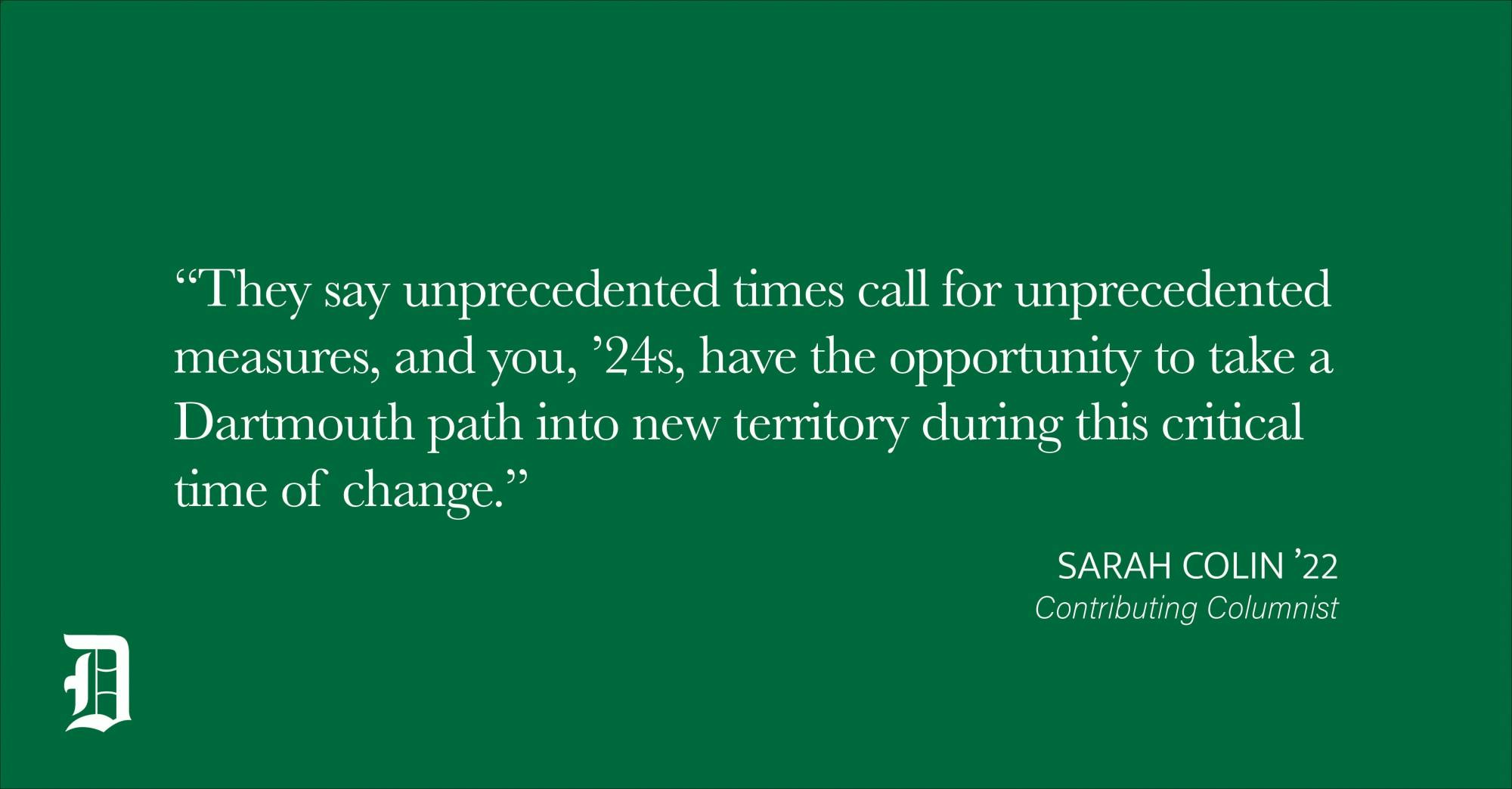This column is featured in the 2020 Freshman special issue.
There is an unspoken set of guidelines that dictate the path of the “typical” Dartmouth student. They suffer through their freshman winter, rush sophomore fall, peak over sophomore summer, go abroad junior year, undertake an internship their junior winter and end up working after college for the same company. Despite the diversity of opportunities available at Dartmouth, this classic sequence remains the accepted normal here. Indeed, many Dartmouth students seem to be stuck on the idea of a “classic Dartmouth track,” defined by majoring in economics, participating in corporate recruiting and throwing oneself wholeheartedly into Greek life. But despite its popularity, this track is not for everyone.
This year, Dartmouth as we know it has been disrupted. Despite all of the hardships and disappointments, I argue that these disruptions present an opportunity to deviate from the norm and explore Dartmouth experiences that lie beyond the classic Dartmouth track. By taking the extra time provided by quarantine and reduced opportunities for social interaction to focus on the other potential tracks at Dartmouth, ’24s can make the most of their first introduction to the College.
Throughout the beginning of my time at Dartmouth, I tried to partake in what I viewed as the essential Dartmouth way of life. At first, this was harmless. I quickly assimilated to Dartmouth’s unique culture, incorporating words like “blobby” and “flitz” into my everyday vernacular and relishing all of the freshmen initiation traditions. I cherished Green Key and sophomore summer stories from upperclassmen, longing for the days when I would get to experience these myself. However, as fall term went on, my attempts to follow the classic Dartmouth track and be a typical Dartmouth student left me constantly disappointed in myself.
When I stayed in on an “on-night,” I felt like a loser because it seemed like everyone else was out at the frats. When I sat in the stacks scrolling nostalgically through old high school pictures, I felt like a baby because it seemed like everyone else had no problem leaving home and jumping headfirst into the social scene. I was objectively having a pretty great transition to Dartmouth, but my perspective was tainted by my belief in the superiority of the classic Dartmouth track.
One day, I finally stopped letting this idea of the classic Dartmouth life dictate my decisions. I realized that there are so many meaningful facets of Dartmouth that are equally as formative in students’ experiences as hallmarks like Greek life or corporate recruiting, yet less frequently talked about. For instance, I tried out for an improv group on a whim during my freshman fall. This decision ended up redirecting my academic course at Dartmouth by prompting me to rediscover my passion for creative thinking and writing, which I had previously disregarded in favor of more conventional paths of study. My improv group has also exposed me to some of my closest friends, whom I probably would have never otherwise encountered. If you told me on the first day of college that two months later I would be dropping out of my computer science class and going on tour with a comedy troupe, I never would have believed it.
I want to acknowledge that your freshman year is going to look very different from mine; in many ways, you won’t even have the opportunity to follow the classic Dartmouth track. But this could come with its own benefits.
Freshman year, I dug myself into a hole because I never stopped to reflect on whether or not I was happy with my commitments. Learn from my mistakes — use the time you have, in quarantine for instance, to reflect on what you are really looking to get out of your Dartmouth experience. Ask yourself whether you enjoy what you are doing, or whether it is just another rung in the ladder that you must climb to get to your next step.
As an example, you might consider exploring less popular departments. Dartmouth has many small but reputable departments such as Native American studies, philosophy and history — consider deviating from the more common first year courses in favor of a class from one of these. Dartmouth also has a plethora of centers for interdisciplinary study, such as the Ethics Institute, the Dickey Center or the Center for Social impact, which are particularly helpful for freshmen who don’t yet have a focused academic interest. Moreover, there are many niche research opportunities and fellowships, which I certainly didn’t know existed my freshman year, that can be sought out through department websites or with help of the Center for Professional Development.
They say unprecedented times call for unprecedented measures, and you, ’24s, have the opportunity to take a Dartmouth path into new territory during this critical time of change.
Take the road less traveled, or at least consider it. While the classic Dartmouth track might be right for some, it certainly is not for all. The disruptions presented by the COVID-19 pandemic provide time for you to consider how to make the most of your time at the College on the Hill.




